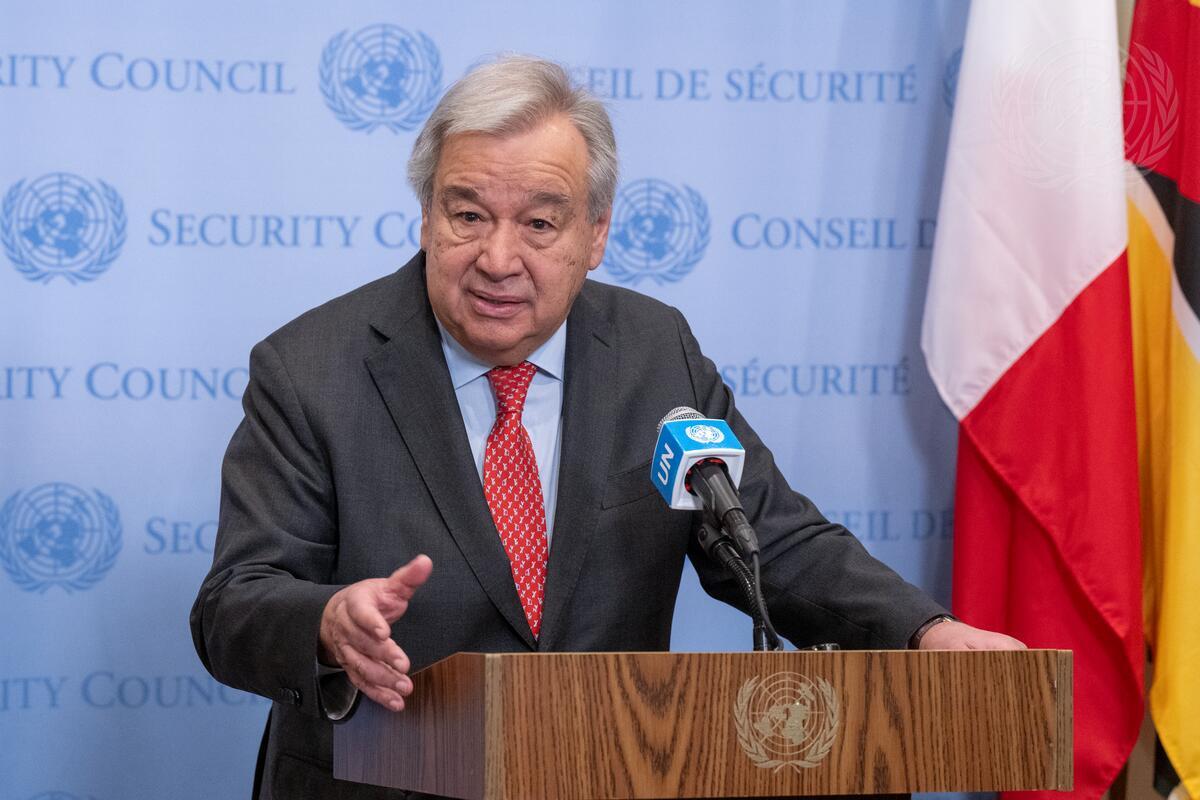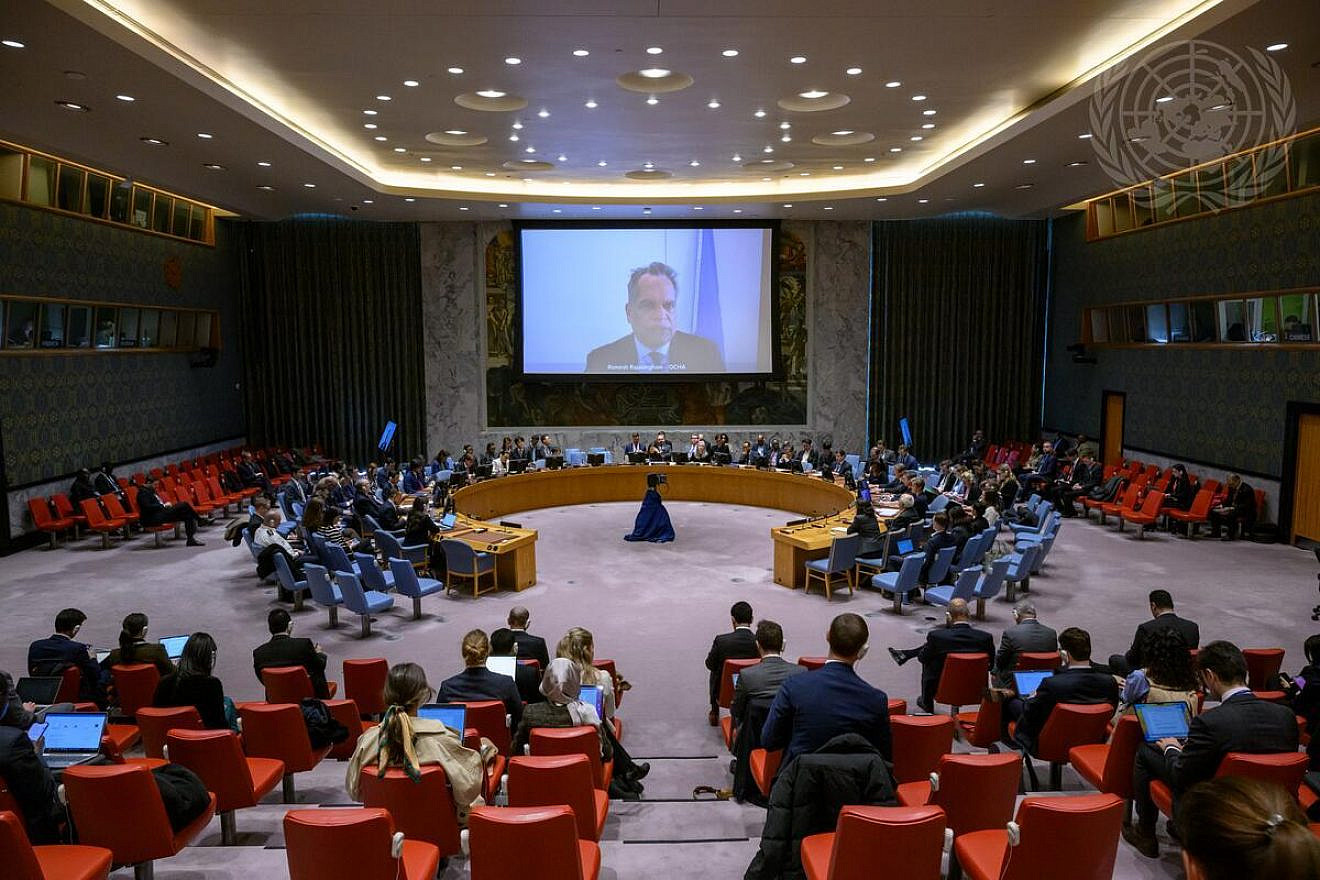Ramesh Rajasingham, head of the U.N. Office for the Coordination of Humanitarian Affairs and OCHA’s representative in Geneva, called for an international arms embargo of Israel during a U.N. Security Council meeting on Friday.
“All member states can and must use their leverage to prevent and stop violations of international humanitarian law,” Rajasingham told the council, “through diplomatic and economic pressure, conditioning arms exports on compliance with the rules of war and cooperation in combating impunity.”
Rajasingham’s call for such an embargo appears to be the first such statement by a salaried U.N. official during Israel’s war against Hamas. Special rapporteurs are unsalaried.
“We believe that the council needs to agree on measures which should be adopted vis-a-vis West Jerusalem,” Vassily Nebenzia, the Russian U.N. envoy, said, seconding the statement. (Moscow recognized the western part of the holy city as Israel’s capital in 2017.)
Those measures, “could include an arms embargo or other types of sanctions,” according to Nebenzia.
Gilad Erdan, the Israeli U.N. ambassador, struck a note of contrition on Friday, telling the council of Israel’s “sorrow” over this week’s airstrike on a World Central Kitchen aid convoy, killing seven people, including an American.
A preliminary Israeli investigation suggested that a misidentification led to the fatal strike. The Israel Defense Forces announced the dismissal of two senior officers as well as other disciplinary measures.
“The military’s standard operating procedure was violated, but it was the result of a tragic mistake made due to Hamas’s cynical modus operandi to exploit civilian infrastructure and vehicles,” Erdan said.
U.S. President Joe Biden told Israeli Prime Minister Benjamin Netanyahu on Thursday that “U.S. policy with respect to Gaza will be determined by our assessment of Israel’s immediate action on these steps,” according to the White House.
Sen. Tom Cotton (R-Ark.) wrote on Friday that Biden was “shameful.”
“To help his polls in Michigan, Joe Biden just strengthened Hamas’s negotiating position,” Cotton wrote. “He effectively encouraged Hamas to hold out and not release the hostages.”
Martin Indyk, a distinguished fellow in U.S.-Middle East diplomacy at the Council on Foreign Relations and a former U.S. ambassador to Israel, characterized the call as “Biden tells Bibi he wants an ‘immediate ceasefire in Gaza’ and a more lenient position in negotiations with Hamas to achieve a hostage exchange deal.”
“We are deeply concerned Israel has not done enough to protect humanitarian aid workers or civilians,” John Kelley, U.S. political minister counselor in New York, told the U.N. Security Council on Friday.
“For that reason, the resolution the United States introduced last month in this council demanded ‘all parties to the conflict fully respect humanitarian notification and deconfliction mechanisms and remediate any deficiencies,’” he said.
Kelley noted the “serious allegations regarding UNRWA personnel tied to Hamas,” and said that Washington supports “ongoing investigations” into the U.N. Relief and Works Agency.
“At the same time, however, we note UNRWA’s indispensable role in distributing humanitarian assistance in Gaza, especially given a looming famine,” he said. “Onerous restrictions on UNRWA’s work are unacceptable, especially given grave concerns about a looming famine.”
Biden signed the Further Consolidated Appropriations Act, 2024, which strips U.S. funding for UNRWA for a year, into law on March 23.
“Of course, even as we press Israel to do much more to protect humanitarian workers and facilitate the life-saving work of the U.N., including UNRWA, we must not ignore how Hamas’s actions have put humanitarian personnel at risk,” Kelley said. “Tunneling under and storing weapons in hospitals is a violation of the laws of war and we condemn it.”

Prior to the council meeting, U.N. Secretary-General António Guterres said he was “deeply troubled by reports that the Israeli military’s bombing campaign includes artificial intelligence as a tool in the identification of targets, particularly in densely populated residential areas, resulting in a high level of civilian casualties.”
He was referring to a report in Israeli media that Israel uses an AI program called Lavender to develop a kill list of tens of thousands of suspected terrorists, with little vetting or human oversight. The report accuses the IDF of sacrificing high levels of innocent Gazan civilians, including whole families, in pursuit of terrorists in high-density residential areas.
The IDF denies the existence of any such list. A spokesperson for the Israeli military said that Lavender is a tool that analysts use in addition to “independent examinations” to “verify that the identified targets meet the relevant definitions in accordance with international law and additional restrictions stipulated in IDF directives.”


























